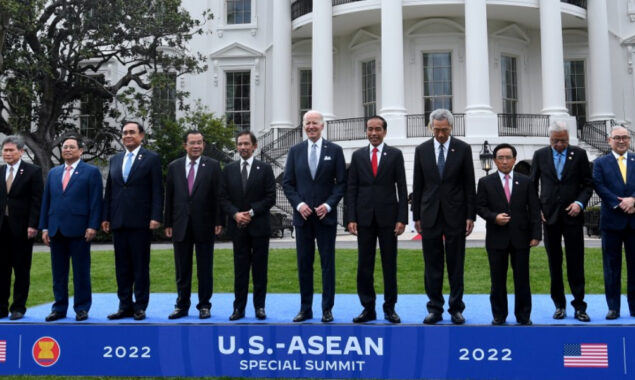
President Joe Biden welcomed Southeast Asian officials to Washington on Thursday, promising to boost clean energy and marine security as China expands its footprint in the region.
Eight of the Association of Southeast Asian Nations (ASEAN) ten members came to Washington for the two-day summit, which began with a closed-door White House dinner of thyme poached chicken and vanilla ice cream.
Despite months of heavy concentration on opposing Russia’s invasion of Ukraine, the Biden administration, which entered office identifying China as the main foreign challenger, is eager to demonstrate that it is still emphasizing Asia.
The White House offered $150 million in new programs, a pittance in comparison to a $40 billion plan for Ukraine and the billions poured into the region by China, which has also asserted its might in the tumultuous South China Sea.
However, the US claimed it was working with the private sector and that Biden would announce a wider package, the Indo-Pacific Economic Framework, when he visits Tokyo and Seoul next week.
House Speaker Nancy Pelosi made the connection earlier in the day when she invited ASEAN leaders to lunch and pushed them to stay firm against Russia’s incursion.
“If left unchecked, we leave the door open to additional aggression, including maritime issues and other issues in the South China Sea,” she said.
– ‘Candor’ over rights –
Pelosi called the summit “another manifestation of America’s commitment to be a strong, reliable partner in Southeast Asia.”
In a contrast to China’s hands-off approach, Pelosi said she believed in “candor” and urged the Southeast Asian leaders to respect human rights, voicing particular concern about LGBTQ people.
“Let me be clear: when we hear about the torture of LGBTQ people, that is unacceptable to the American people — and continues to be an obstacle to the full respect in our relationship,” she said.
Pelosi did not single out countries but Brunei and Indonesia’s Aceh province have both triggered uproars with laws that allow for physical punishment over consensual gay sex.
In the biggest chunk of the new funding, the White House said it was committing $60 million to new maritime initiatives that will include the deployment of a Coast Guard cutter and personnel to fight crime including illegal fishing.
The White House said it was also devoting $40 million to invest in clean energy in the climate change-vulnerable region and was working with the private sector to raise up to $2 billion.
Another initiative — launched as Biden separately held a virtual summit on Covid — includes a project to test for emerging respiratory diseases through a new office in Hanoi of the US Centers for Disease Control.
“I hope this meeting can build momentum for the return of the US presence in the region,” Indonesian President Joko Widodo told a sideline forum of the US-ASEAN Business Council.
– Meeting Myanmar opposition –
However, after the junta deposed Aung San Suu Kyi’s elected administration in February last year, the US has increased pressure on Myanmar, which was previously touted as a democratic success story.
At the summit, the United States represented Myanmar with an empty chair.
The democratic exile leadership was invited to Washington and met with Deputy Secretary of State Wendy Sherman, but they did not represent Myanmar in the talks.
After holding elections on Monday, the Philippines did not send its president and was represented by its foreign minister.
Cambodia’s experienced strongman Hun Sen, the current head of ASEAN, and Thai Prime Minister Prayut Chan-O-Cha, the former army chief who led a 2014 coup, are among those attending.
Human Rights Watch said the United States needed to raise democracy in more countries than Myanmar.
“If the US doesn’t publicly raise human rights concerns during meetings, the message will be that human rights abuses are now tolerated in the name of forging alliances to counter China,” said John Sifton, the group’s Asia advocacy director.
Read More News On
Catch all the International News, Breaking News Event and Latest News Updates on The BOL News
Download The BOL News App to get the Daily News Update & Follow us on Google News.




